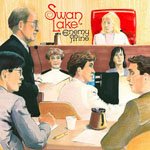
Swan Lake Enemy Mine
(Jagjaguwar)
Assume that the following are true:
1). The Velvet Underground’s Loaded was the last album ever released and no one’s heard from Lou Reed or John Cale ever since.
2). Ziggy Stardust is either a constellation or a comic strip.
3). Eno? Devo? Those are board games, right?
In this alternate reality, Enemy Mine, the second album by Indie supergoup Swan Lake, owns the authenticity of the acts that (hadn’t) preceded it. As Swan Lake counterparts Carey Mercer (Frog Eyes), Daniel Bejar (Destroyer, The New Pornographers) and Spencer Krug (Wolf Parade, Frog Eyes) dance, prance or stomp their respective ways through the nine songs that make up Enemy Mine, they willingly convey their obvious fascinations and infatuations to emulative proportions, rewriting, summarizing and modernizing the individually distinct contributions granted 70s pop music history for the upcoming decade. An album for the “reconsider and try again and then again” generation.
As Mercer’s Bowie lust holds prominence, his inflections divulging said lust amidst the minimal and outlying backdrop of Spanish Gold, 2044, one can almost imagine his teenage walls plastered with images of Reed and Ziggy, lipsticked and gimmicked, the Spiders From Mars spending its tenth rotation just before suppertime commenced. The same holds true for Bejar, his “Or was it truly springtime in Paris for that piece of shit?” piano-laden inquiry (Heartswarm) as Velvety as Nico’s indiscretions.
But as Swan Lake’s three distinct personalities entwine, Enemy Mine maintains cohesion, its combined sensitivity a reliable constant in the face of its ambition, (or its revision), and its members each given equal ground for their own (ahem) expression.
Mercer strives and strangely succeeds on improving upon Bowie. Or, at least he manages to modernize Bowie better than Bowie seemed capable, (the deplorable 80s period sort of speaks for itself and Bowie’s attempts at Reznor-rection, while they weren’t bad, seem ridiculously dated now). As Mercer’s deep and melodiously spoken stream-of-consciousness serpentines through his other heavily weighted contributions, Peace and Warlock Psychologist, the reverberating hammers drop around his verses as if to drive them into the ground, the album’s rigor his burden to bear.
Bejar tackles Reed, but that’s it. His inebriated, war torn bent elbow plays up the ye olde march Battle Of A Swan Lake, Or, Daniel’s Song, and some proto-revivalist rock n’ roll is enjoyed with the well-performed and worthwhile Spider.
Spencer Krug keeps a level of enchantment at hand, playing the comically medieval minstrel (Paper Lace) or taking a stab at some Mothersbaugh joviality (Settle On Your Skin). His melancholic piano ballad, A Hand At Dusk, seems the album’s sole Swan Lake song, the point where all of the pieces and all the influences seem owned:
“There's architecture here/And there are mountain peaks/And places dwelled upon by those/Who climb much higher than me…”
The eventual heightening of sound slowly catches up with the piano generating this thick symphonic glow: Enemy Mine’s Tchaikovsky moment; Swan Lake officially tied to its namesake.
Granted the omission of leadership allows Swan Lake’s members the opportunity to inspire each other, songwriters engaged in bolstering Swan Lake’s relevance as more than just a vanity project. But, as the band's egos seem understated, the egos of their inspiration course with vigor, almost denying the band any voice of their own. As well crafted and fascinatingly acute as Enemy Mine is, it lives in an alternate reality: a place where too much need be forgotten in order to grant Enemy Mine what it would otherwise deserve.
